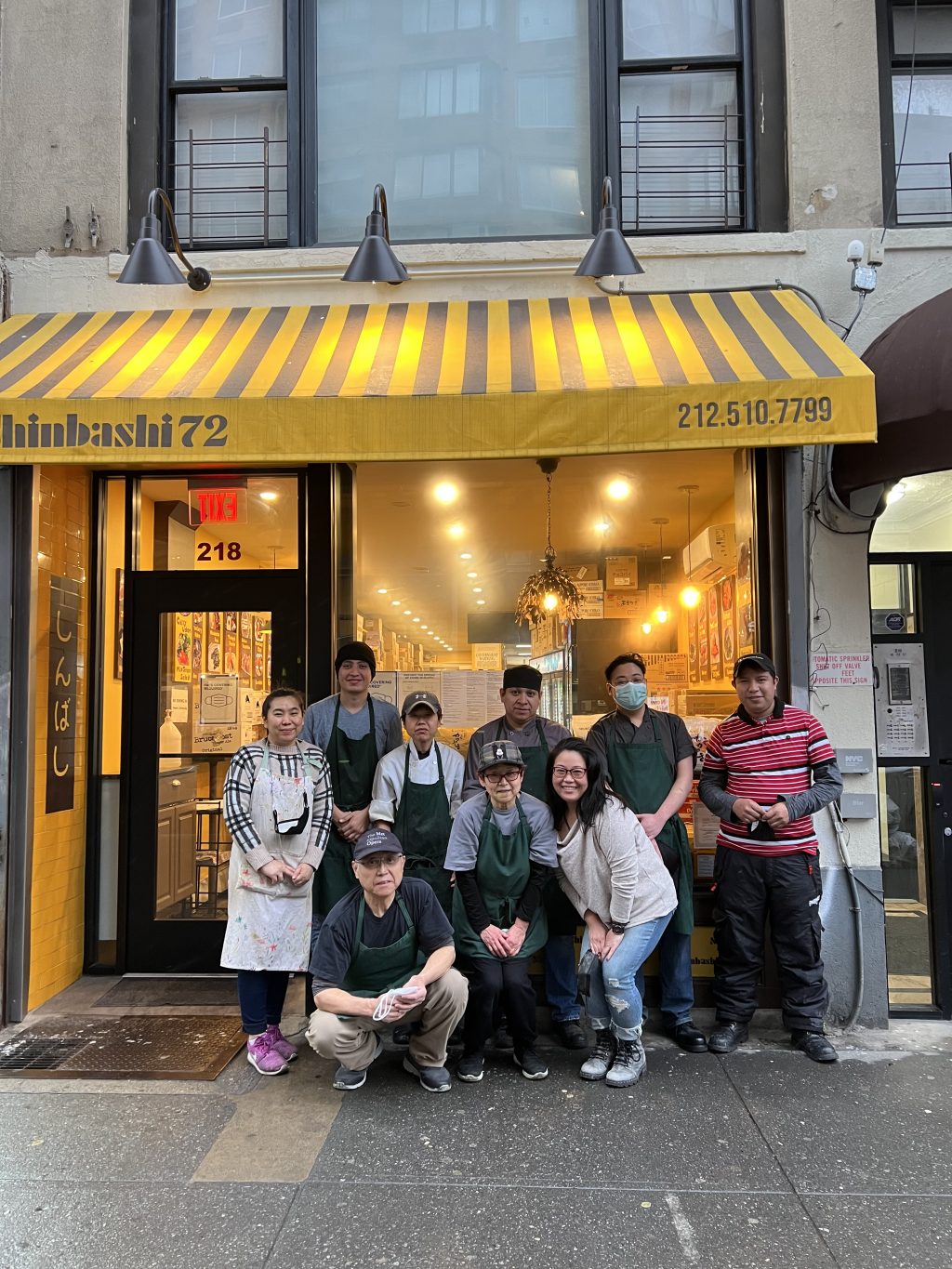
The Shinbashi Team outside Shinbashi 72: Front L-R: Toku Sangarch; Takeshi Katayama; Akiko Katayama and Emiko Katayama. Back L-R: Daniel Barrios; Masami Yamashita; Alfonso Sanchez Vargas; Takanori Katayama and Elvis Can.
By Claudie Benjamin
People rave about the rice balls at Shinbashi 72. The excellence in preparation of the rice – a foundation of Japanese cuisine doesn’t happen by chance. “My Dad, Takeshi Katayama takes care of the rice starting at 8:30am every morning,” says his daughter Emiko. Takeshi’s approach combines intuition with traditional guidance that has been passed down through generations. It makes him a true master according to his daughter who works in the shop with her father, mother and younger brother. “My Dad is very particular about rice. It can’t be not too soft, squishy or too stiff”.
Mom, Akiko is the main cook. Armed with many of her own recipes, she has a sure sense of what it takes to make traditional comfort foods taste just the way they should. Her classic Oden is hugely popular at Shinbashi 72. Emiko explains it is a broth with fish cakes, horseradish and yam cakes. Oden is a seasonal dish in Japan, being served primarily during the winter months. But due to frequent customer requests, her mom decided to keep this item on the menu year-round. She is responsible for all of the new menu item launches.
Emiko’s brother Takanori, assists his parents in the kitchen. When asked about her role, Emiko says she’s not much of a cook and manages the back of house business operations, but frequently tastes new dishes her mom plans to introduce.
The business was started in 1974 by Emiko’s grandmother Fumiko Hosoda. Describing her grandmother with utmost enthusiasm and admiration, Emiko says Fumiko was divorced with a young daughter, when she came to New York. She did not speak a word of English. But, determined to be an independent businesswoman, she somehow managed to pass the exam required to open a restaurant.
Fumiko named her restaurant Shinbashi which means new bridge. The name corresponded with her idea of introducing traditional Japanese foods to New Yorkers. At that time, hard as it is to believe now, there were relatively few Japanese restaurants in the city.
That restaurant located on Park Avenue was refined and upscale. Over a few difficult years, Fumiko retired as did an uncle who had decided to manage the restaurant after her. Emiko’s immediate family then, in 2013 took over the restaurant until 2019, later moving to the Upper West Side, at 218 West 72nd Street in 2020.
Emiko had been living in the Upper West Side for more than 20 years when she was a marketing and international business student at NYU. She says she wanted the food and mood of the shop to match the sophisticated, understated character of the neighborhood that would get a kick out of discovering delicious classic Japanese comfort foods. For some Upper West Siders, these were the foods they had discovered while studying, working or traveling as tourists in Japan.
The comfort food-style menu was a drastic change from the food prepared in the earlier restaurant. But Emiko’s concept works. Among other favorites are rice balls, a tradition at picnics in Japan and also a much appreciated lunch box treat. They have also been known for their Japanese curry, Bento and Udon (Japanese thick noodle) dishes. Their version of Japanese curry takes about four hours of preparation, and has been her Mom’s recipe since childhood.
Emiko says that when her family was opening the store on 72nd Street, they were worried about getting the gas working in time for their opening. That, more than anything, inspired putting Japanese groceries and picnic foods on the menu.
Set up for take-out or delivery, it turned out that customers who came into the shop were hugely pleased to discover an array of Japanese grocery products that were sometimes hard to find. These included Japanese rice, drinks, sauces, curries, pastes, soups and snacks. Now the grocery sales account for about half of the shop’s business.
Emiko and her family are very close and it’s encouraging to them to see their hard work appreciated in the neighborhood. It all seems they share that determination and commitment that was modeled by the first of their family to come to New York. “Whenever I’m not sure what to do,” says Emiko, “I ask myself what would my grandmother have done?”.
